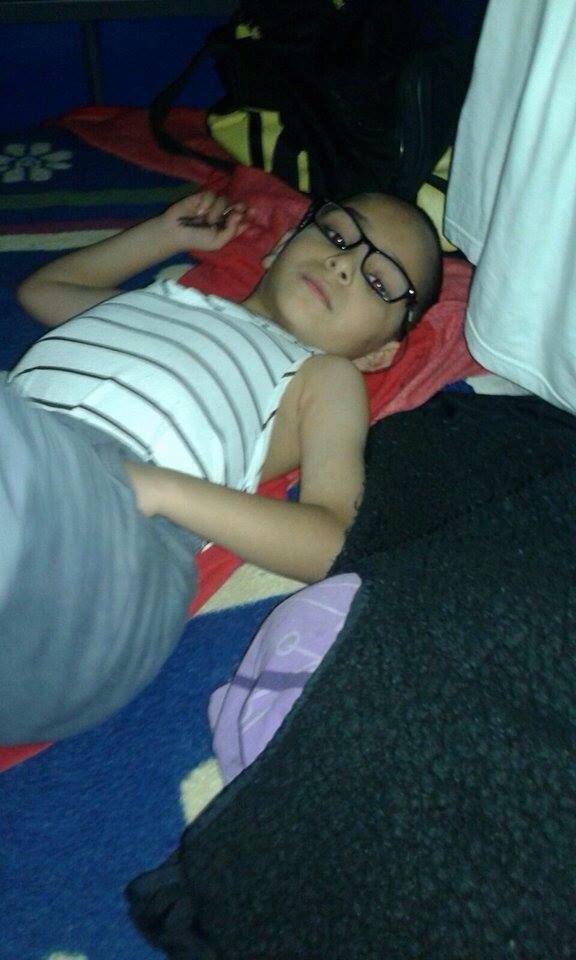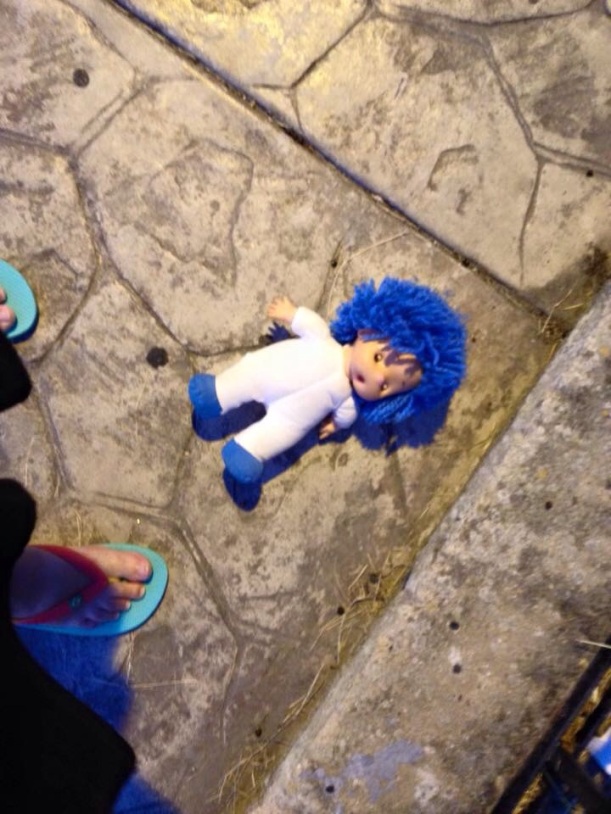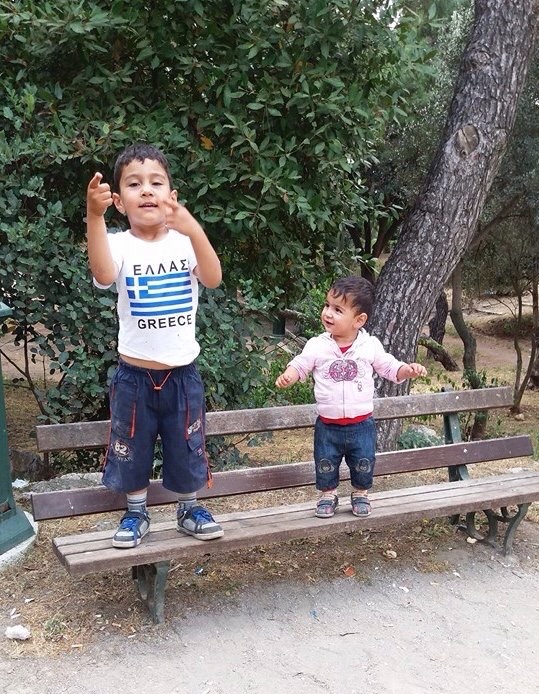
5000 mennesker bor under primitive forhold på havnen i Piræus.
Gyldne blade faldt, da jeg forlod øen for et halvt år siden. Nu blomstrer de vilde kirsebærtræer og tjørnebusken hvidt og får øen til at ligne en uskyldig brud. Om lidt vil rapsmarkerne lyse gult. Forårsvinden er stadig skarp. De første, jeg møder på skovstien, er en flok kampklare soldater. Med camouflagemalede ansigter og maskinpistolerne hævet i skydehøjde venter de på at blive fløjet til nye krige i fjerne lande.

Syriske flygtninge har slået sig ned i telte i den jordanske ørken.
Krigen var tæt på hele vinteren i Amman. Fem og halv fjers kilometer til grænsen mellem Jordan og Syrien, og det var nærmest en vane for de jordanere og syriske flygtninge, som boede tæt på at blive vækket om natten af præsident Assads bombemaskiner. Inde i Syrien spredte de død og ødelæggelse, og det skete, at de smed deres last af tøndebomber og andet skidt i Jordan. Så protesterede det lille kongedømme, men hvad hjalp det mod en dødsmaskine bestående af vældige lande som Rusland, USA, Tyrkiet, Frankrig og lille Danmark, og hvem, der ellers har syntes, de skulle blande sig i den syriske borgerkrig?
Det er en meget mærkelig fornemmelse at være så tæt på al den krig. På tre måneder nåede jeg at udvikle en vis immunitet, selv om det aldrig blev hverdagskost. Som en kvinde fra Dubai sagde til mig: Vi er så vant til det, at jeg aldrig tænker på. Jeg skulle have boet hos en syrisk flygtningefamilie tæt på grænsen, men blev snotforkølet, og opholdet blev aflyst, og det var måske meget godt. Jeg behøvede sådan set heller ikke at opsøge krigen. Jeg kunne bare nøjes med at åbne Facebook, hvor jeg fik smidt alle grusomhederne lige i hovedet af fortvivlede syriske venner uden for og – inde i – Syrien. Araberne deler flittigt billeder af lemlæstede børn med afrevne legemsdele og knuste døde mennesker begravet i støvede murbrokker. Deres måde at gøre opmærksom på grusomhederne.
En morgen er der billeder af radmagre mennesker med brystbenene stikkende frem. Døende fra den belejrede syriske by Madaya, kun 150 kilometer fra, hvor jeg sidder i sofaen og drikker min kaffe og spiser min musli. 40.000 indespærrede beboere har levet af katte og kogte blade i månedsvis, og børn og gamle dør nu af sult.

5000 flygtninge bor lige nu under kummerlige på havnen i Piræus, Athen.
Hjemme på fredelige Bornholm er det svært at slippe gruen. Alle de mennesker, jeg har lært at kende, alle de børn og alle de mange jeg bare så på min vej.
To måneder på den græske ø Leros. Dengang flygtninge endnu var så nogenlunde velkomne i Europa. I overfyldte gummibåde landede de på den græske militærø Farmakonisi, hvor de blev modtaget af øens soldater, som affyrede skræmmeskud og gav dem en pakke kiks og lidt vand at leve af, indtil de en dag blev hentet af det græske militær og sejlet til Leros.
Tre kolde vintermåneder i Jordan med krigen tæt på, og to måneder i Athen, hvor mere end 50.000 flygtninge, heraf 22.000 børn i dette øjeblik er fanget i et Europa, der har lukket sine grænser med pigtråd, tåregas og kampklædt politi og militær. Det før så humane Europa spærrer nu børn inde bag pigtråd, deporterer mennesker tilbage til den visse død, og lukker øjnene for de kummerlige forhold i den gigantiske flygtningelejr, vi er ved at omdanne Grækenland til.

Tre børn og en ældre kvinde er begravet her på øen Leros. Alle druknede under flugten fra Tyrkiet til Grækneland.
Der var også de tre syriske mødre på mit hotel på Leros. Hver havde de natten før mistet et barn under flugten over havet fra Tyrkiet mod Europa, og den gamle mand ved siden af mig i sofaen, som mistede sin kone i samme ulykke. De var alle fra samme by i Syrien. Eller den far, som igen og igen gentager:

Fem-årige Suleiman i fængsel i Tyrkiet.
-Jeg har siddet fire måneder i et tyrkisk fængsel med mine børn – tre måneder i et hul under jorden. Uden dagslys. Jeg troede ikke på, at vi kom ud igen. Og jeg så på, hvordan hans had til alt, hvad der var tyrkisk, langsomt åd ham op. Der var også smukke rolige 18-årige Jasmin fra en forstad til Damaskus, som måtte se på, hvordan de græske soldater slog hendes elskede onkel. Og onklen, som spurgte mig, om det her var attituden i Europa. Eller kun 20-årige Hamid, hvis eneste overlevende familie er en onkel i Danmark, som han bare så gerne vil op til. Men Danmark vil ikke have ham, så nu vandrer han hvileløst rundt i Athens gader.
På en måde føler jeg jo en stor taknemmelighed. Jeg har et land, og jeg har et pas, og jeg kan tage hjem, når jeg vil. Jeg rejser ikke jaget rundt i verden på flugt fra krig eller et undertrykkende Talebanregime i Afghanistan. Jeg møder ikke pigtråd og lukkede grænser, når jeg søger tryghed og en fremtid for mine børn. Jeg bliver heller ikke råbt ad af bevæbnede vagter i en græsk flygtningelejr. Eller spærret inde bag pigtråd på en græsk ø for at blive deporteret tilbage til en endnu værre lejr i Tyrkiet eller i værste fald døden.
Nyheder fra Grækenland. En video med mennesker, som skriger i panik. Endnu en brand ved en flygtningelejr i Athen. Sikkerhedsforholdene er elendige i de hastigt oprettede lejre, og en dag vil det koste menneskeliv, tænker jeg.
Jeg læser, at EU har en plan B, hvis den kontroversielle aftale med Tyrkiet glipper. Man vil omdanne Grækenland til en stor flygtningelejr. Så kan de blive der.

Arian måtte flygte fra Afghanistan med sin familie. Nu sidder de fast i Grækenland.
Det er et stort ansvar med tre små børn, skriver Arian, en afghansk familiefar på Messenger fra en flygtningelejr i Athen. Han er kun tredive, skuespiller og flygtet fra Afghanistan, hvor ukendte gerningsmænd en sen aften overfaldt ham og skamferede hans ansigt med knojern. De brød sig ikke om den TV serie om kvindefrigørelse, hvor han spillede hovedrollen. Næste gang slipper han ikke med at få ansigtet ødelagt, advarede de, før de forsvandt.
-Uvisheden er det værste, men i det mindste er jeg i sikkerhed her, skriver han.

Grækenland er omdannet til en stor flygtningelejr efter at Makedonien lukkede sin grænse mod Grækenland. Her bor flere hundrede flygtninge på Victoria Square midt i Athen. Politiet ryddede pladsen kort efter billedet er taget.
Familien med de to små børn og et handicappet ankom til Grækenland netop som Makedonien lukkede grænsen mod Grækenland for afghanere. Landet satte pigtråd op, og politi skød på desperate mennesker, som alligevel prøvede at komme igennem. -Vi vil ikke have jer ind, siger Makedonien med EU i ryggen. Først sagde de det til afghanerne, så til alle andre.
-Hvad vil I her, spørger en græsk betjent den afghanske skuespiller og familiefar den morgen i februar, hvor de ankommer med færgen til Athen. -Vi er bare et stort fængsel for flygtninge, siger betjenten.
Nu bor familien i en flygtningelejr i en container med aircondition, og meget makaroni serveret af det græske militær.
-Jeg er forvirret, og indimellem græder min kone stille, sagde Arian, da jeg endnu var i Athen.
Hjemme får jeg et stort knus af Shofiq. Det er et halvt år siden, jeg pludselig rejste fra ham, og i lang tid nægtede han at tale med mig på Skype. Så fik han tre kaniner, og det var alligevel så spændende, at forbindelsen blev genoprettet.

Hvorfor har du været så langt væk, spørger han og putter sig ind til mig.

Udsigt fra cafeen i Amman.
Jeg sidder på en cafe med udsigt over Ammans hustage og drikker stærk kaffe med kardemomme. Det er i februar og i solen dejligt varmt. Foran mig ryger et par unge tørklædeklædte kvinder vandpibe, og muezzinen har lige kaldt til bøn fra moskeen overfor. Jeg tager et billede af Ammans hustage med alle vandtønderne stillet op på række og læser på BBC’s netavis, at Saudi Arabien nu også vil blande sig i krigen i Syrien. Kongedømmet lige syd for Jordan vil sende soldater, der skal kæmpe på Tyrkiets side.
Den krig er et stort morads. Mon sauderne vil sende deres kampvogne op gennem Jordan på den nedslidte Desert Highway? Jeg sørger hele tiden for at have penge nok, så jeg kan komme hurtigt ud af landet.
Det er koldt på Bornholm, og det sner, selv om vi snart har maj. De første små bøgetræer står lysegrønne, og skovbunden er hvid af anemoner. Ramsløgene dufter, og jeg plukker så mange, jeg kan spise.
Der var forøvrigt også den syriske familie i en forstad til Amman, som var så fattige, at børnene ikke havde noget legetøj.

Den olympiske fakkel kom også til en af flygtningelejrene i Athen.
En selfie tikker ind. Skuespilleren fra Afghanistan står med den olympiske ild i flygtningelejren i Athen.
Jeg blander mig på Facebook i et opslag fra Susanne Bjerrehus. Hele tiden er der falske opslag om flygtninge. Gamle videoer, der bliver lagt ud, som var det lige sket. En ukendt mand sender mig en besked på Messenger. Han kalder mig landsforrædder.
Og hele tiden ved jeg, at i Athens nedslidte gader vandrer en kun 20-årig syrisk mand deprimeret rundt, og i en lejr i samme by sidder en afghansk familie og frygter fremtiden.

I havnebassinet på Øen Kos flød det med punkterede gummibåde og gamle skibsvrag.
En sort sko ligger glemt mellem småstenene på den bornholmske klippestrand. Så mange enlige sko langs strandene på Kos. Så mange punkterede gummibåde. Og skibsvrag i havnebassinet. Og efterladte årer, så flygtningene kunne ro ind, når dunken med benzin til motoren var tom. Jeg kikker på billeder af redningsveste, en hvid barnehue og en glemt tøjdukke med blå fletninger.

En efterladt dukke på havnen på Kos.
Og jeg husker den morgen, hvor et par unge mænd i morgendæmningen lykkelige og lettede tog billeder af hinanden på stranden på Kos. De var netop kommet over fra Tyrkiet. I natten hørte vi skrig fra havet. I håb om at komme de nødstedte til hjælp kørte jeg med en engelsk sygeplejerske op og ned langs stranden flere timer. Vi fandt dem ikke, men forhåbentlig var det dem, som nu var kommet sikkert i land. Ihvertfald hørte jeg ikke om nogen drukneulykker den nat.
Kirsebærblomsterne falder ned som store snefnug og lægger sig som et hvidt tæppe på den asfalterede vej. I Rø maler en kvinde sin postkasse rød. En kold havgus har lagt sig over øen, og det blæser pludseligt op. Jeg kan høre gråd i vinden, der kommer fra syd. Så mange mennesker græder. Det gør jeg også, da jeg hører, at Hamid er sikkert landet i Sverige.





 In January in Amman in Jordan I met 12 year old Ibrahim in a rehabilitation center. Ibrahim was badly wounded by a barrel bomb one year ago in Syria. In the same air strike he lost his mum, one sister, three brothers and five cousins. His dad was elsewhere the day the bombs killed his family in the village, where they were hiding and now Ibrahim and his dad is together in Amman.
In January in Amman in Jordan I met 12 year old Ibrahim in a rehabilitation center. Ibrahim was badly wounded by a barrel bomb one year ago in Syria. In the same air strike he lost his mum, one sister, three brothers and five cousins. His dad was elsewhere the day the bombs killed his family in the village, where they were hiding and now Ibrahim and his dad is together in Amman.



























